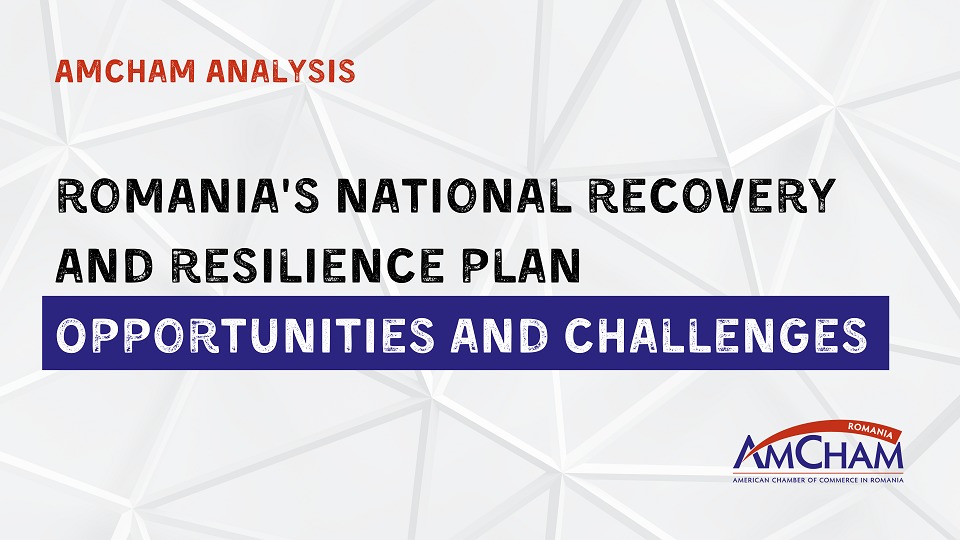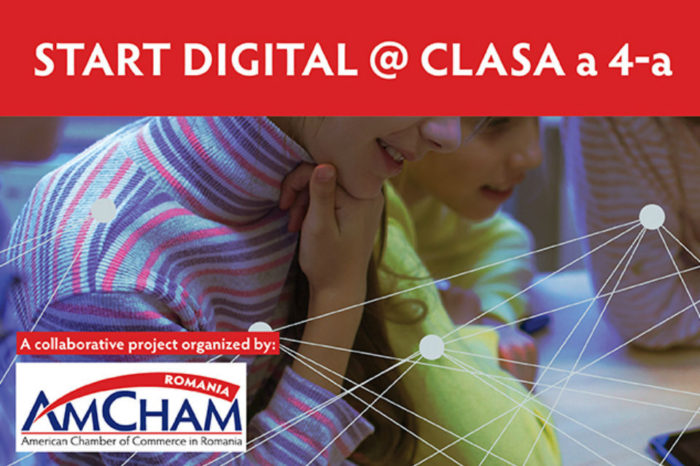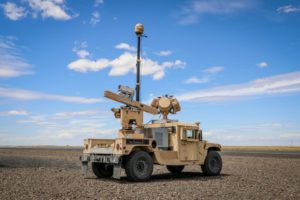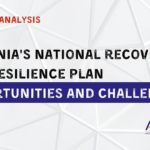Horizon 2026: National Recovery and Resilience Plan – between opportunities and challenges for education (AmCham analysis)

The state of the Romanian education system is characterized by the existence of systemic problems, which have not received an adequate response in the recent decades. These include poor school infrastructure, high school dropout rates (according to the Social Monitor conducted by Friedrich Ebert Stiftung, the dropout rate in 2019 was 15.3%), poor results of Romanian students in national and international assessments (such as PISA testing) and the functional illiteracy rate (the PISA 2018 results also indicate a functional illiteracy rate of 40%).
The crisis caused by the COVID-19 pandemic and the subsequent online teaching activities have exacerbated these problems and brought additional challenges to an education system that was not prepared for such a teaching and learning paradigm shift, given that, according to Eurostat, only 56% of young people between the ages of 16 and 24 have basic digital skills, necessary in the context of carrying out online activities. Beyond the immediate impact on the educational process, this reality places Romania on the last place in the European Union in terms of human capital development in the DESI 2020 index (Digital Economy and Society Index).
In this context, Romania must make every effort to maximize funding opportunities through the NRRP and the 2021-2027 operational programs in order to modernize and improve the performance of the Romanian education system, while using in an optimal manner the national budget allocations.
In AmCham’s view, the reform and investment priorities in the education system are:
1. Investments in the education infrastructure
2. Investments in the teachers’ training
3. Investments in the digitalization of the education system
4. Interventions in education tailored to the specific needs of local communities
5. Professionalization of the schools’ management
6. Investments in the early education system.
We salute the Government’s decision to commit to these priorities, also included in the “România Educată” report, as part of the effort to make the education reform a national priority.
For each of these priority areas, we present below intervention directions and specific challenges that need to be considered in the implementation phase. At the same time, we emphasize that for a successful implementation of the educational reform and projects financed by the NRRP and by the operational programs 2021-2027, regardless of the investment field, it is necessary to:
- Improve the transparency of resource allocations in the Romanian education system;
- Ensure the stability of regulations and legislation regarding the organization and functioning of the Romanian education system;
- Ensure an efficient resource allocation to scalable projects, which can generate a positive impact on the entire education system;
- Ensure the coordination between national and European priorities in the area of education.
Opportunities and challenges for the successful implementation of educational reforms and projects funded by the NRRP:
Investing in the education infrastructure: an integrated approach, stimulating both the use and maintenance of infrastructure
Although the development and modernization of school infrastructure across the country is necessary, investments in infrastructure are insufficient and, in the absence of complementary interventions, will not have a significant positive impact. Investments in school laboratories and workshops must be accompanied by training programs for teachers and a rethinking of educational content and curriculum so that the infrastructure is of real use in the teaching process. The development and implementation of safety standards for the use of school laboratories are also important, along with the training of auxiliary and non-academic staff responsible for the maintenance of these infrastructures. At the same time, mechanisms must be developed to allow schools to replenish the consumables needed for the use of school laboratories.
Investments in teachers’ training: reform of life-long vocational training and teacher evaluation
The success of the educational reform depends on the training of teachers and on the adequacy of teachers’ skills and abilities to meet the specific educational needs of an increasingly dynamic and digitalized society. Unfortunately, the NRRP lacks a reform of the teaching career and of the continuous professional training. Without the development mechanisms for the ongoing teacher evaluation and without adequate opportunities for life-long vocational training (national training programs, exchange communities, best practices exchanges, professional standards, etc.), teachers will find it impossible to keep up with the needs of future generations. Moreover, we draw attention to the fact that a reform of the teaching career is also needed to incentivize new talents to join the Romanian education system.
Investing in the digitization of the education system: increasing the level of basic digital skills for both students and teachers
The COVID-19 crisis has accelerated the process of digitization in education, but also revealed several systemic challenges for the success of the digitization efforts. Of these, the lack of digital skills among teachers and students is the most pressing and needs to be prioritized. In the context of the digital transition across the European Union, the development of digital skills is imperative. The adoption of new technologies in teaching must be complemented by measures to ensure the security of their use, in particular, with regards to the use of the Internet. Also, the digitization of the education system must be correlated with the Digital Education Agenda of the European Union, to ensure the coherence of the Romanian education system with the education systems of other Member States. Based on the experience of other systems, the digitization of education, especially through the increased usage of open educational resources (OERs), can significantly contribute to reducing the inequities in the system and to improving access to education for students in vulnerable communities.
Interventions in education tailored to the specific needs of local communities, including the reform of the financing mechanism
The current precarious state of the education system in Romania was also caused by an inadequacy of educational policies to the specific (different) needs of local communities. It is necessary for the NRRP funding to cover these needs by directing resources to the disadvantaged communities. Also, the education reform must be supported by a redesign of the financing model of the education system, by changing the per student funding paradigm, with a funding paradigm that takes into account the different needs of schools across Romania. This will encourage performance and intervention mechanisms will be provided to improve the quality of education, where there are needed. Moreover, such an approach will eliminate the artificial competition between schools in Romania, ensuring the premises for a sustainable development of the education system.
Professionalization of the schools’ management: clear, objective and transparent criteria for the selection and evaluation of school management
We welcome the intention to increase the autonomy of schools in Romania which we also consider an appropriate solution for addressing the different needs of Romanian schools and for reducing the gaps between them. However, such measure must be accompanied by the implementation of transparent and competitive mechanisms for the selection of school managers, their continuous professional training, and an increase in the accountability of school managers along with the implementation of national performance evaluation systems based on clear objectives. In the absence of measures to ensure both the transparent governance of schools and the proper selection of school managers, increasing the autonomy of schools can have negative consequences on the quality of education. It is also necessary to implement a transparent and competitive process for the selection of the boards of directors of schools in Romania, in order to ensure their professionalization and the success of the objective of increasing the autonomy of schools.
Investments in early education, quality, quantity, functional partnership with social partners
The significant allocation of NRPP funding for the early education services is welcome, yet, most of the allocations are for the construction of school infrastructure, which is only a part of the solution. In order to achieve the country objectives assumed by Romania and outlined in the “România Educată” Project, it is necessary to ensure the human resources to support quality inclusive early education services, to review and operationalize the legislative framework through which private investors can offer / invest in early education services. Concomitantly with ensuring a functional and efficient framework for partnership with the social partners, with the aggregation and correlation of recent legislation aimed at supporting the development of early education, investments in infrastructure will contribute to increasing the number and quality of these services.
Through its working group dedicated to the education system, AmCham Romania will continue to promote these recommendations in the context of consultations on the implementation of the NRRP.
***
About AmCham Romania
The American Chamber of Commerce in Romania (AmCham Romania) is a leading representative of the business community in Romania, acknowledged as a promoter of the private-public dialogue on matters related to the business climate, public policies that impact Romania’s economy and competitiveness or the economic ties between Romania and the U.S.
Currently, AmCham Romania’s over 460 members – U.S., international and Romanian companies allow AmCham to engage in promoting the business priorities for many industries, through dedicated working groups, such as: Capital Markets & Financial Services, Corporate Governance, Competition and State-Aid, Education, Energy, Environment, Health, Digital Economy, Labor, Structural Funds, Public Procurement and PPP, Real Estate, Taxation and Tourism.
AmCham Romania’s connection with the international business is granted by its accreditation by the U.S. Chamber of Commerce and its affiliation to AmChams in Europe. In Romania, AmCham enjoys a great institutional collaboration with the U.S. Embassy in Bucharest and is a member and contributor to Coaliţia pentru Dezvoltarea României, the informal consultation platform supported by business associations that share the same objectives.


















